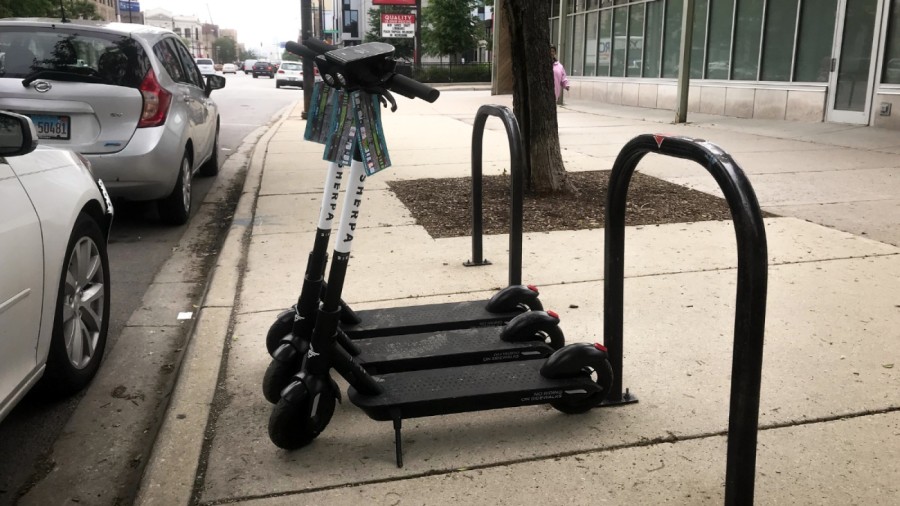Shared electric scooters will soon return to Chicago streets — but not sidewalks
By Becky Vevea

Shared electric scooters will soon return to Chicago streets — but not sidewalks
By Becky VeveaElectric scooters are returning to Chicago streets in May.
Three companies — Lime, Spin and Superpedestrian — will be allowed to operate 1,000 scooters each throughout city neighborhoods.
Initially, those companies’ e-scooters will not be allowed downtown. But, city officials say they will allow Lyft to operate shared e-scooters for the first time ever downtown, using the existing Divvy network of blue bike docking stations.
“We thought the best way to approach this was to leverage the Divvy system,” said Kevin O’Malley, deputy commissioner of the Chicago Department of Transportation, noting that because the Divvy scooters will be able to be docked at retrofitted Divvy stations, they offer “an organized way of parking scooters in the downtown.”
Mayor Lori Lightfoot touted the shared e-scooters as an answer to rising gas prices.
“As transportation costs go up, it is critical that we support micro-mobility solutions like shared bikes and scooters, which provide affordable ways to travel in Chicago without needing a car,” she said in a statement.
The shared scooters will not be allowed on sidewalks, the Lakefront Trail, the 606, Riverwalk or Navy Pier and 50% must be deployed on the South and West sides. Current rules and regulations require riders to lock e-scooters to bike racks, light poles, street signs and retired parking meters.
The shared e-scooters first came to Chicago in 2019, when the city ran a pilot program allowing 10 companies to unleash 2,500 scooters on city streets. The early enthusiasm was also met with criticism from residents who complained the devices were cluttering sidewalks.
The city revised the rules in 2020 for another pilot that allowed just three companies to operate up to 10,000 scooters. Last October, the City Council passed an ordinance to create a new type of license for up to three scooter sharing companies with a revised set of rules and regulations. It also allowed for existing shared bike operators, like Divvy, to add e-scooters.
For the first two months, only Divvy e-scooters will be allowed downtown. The high-tech, two-wheeled devices run by other companies will shut off if they cross into the central zone, which stretches from North Avenue down to I-55 and west to Ashland Avenue, covering a wide swath of neighborhoods, such as River North, Chinatown, South Loop, Fulton Market and West Loop.
After 60 days, Lime, Spin and Superpedestrian can apply to serve those neighborhoods, but O’Malley said there will be a cap on how many e-scooters can be downtown in order to ensure the companies are serving the rest of the city.
“We’re not overly obsessed with downtown,” said Lee Foley, director of government affairs for Lime, adding the company does hope to expand to downtown by midsummer. “We would like to be able to include downtown as a part of the network for our riders to be able to access.”
Foley acknowledged concerns about clutter, particularly downtown. He suggested creating “parking zones” that allow riders to park in an organized way regardless of what company’s e-scooter they use. Divvy stations will only accept Divvy e-scooters. O’Malley said the city is considering “parking zones.”
All of the shared e-scooters will cost $1 to unlock and each company sets its own per-minute cost. Divvy members who pay annual fees and do not have to pay to “unlock” bikes or e-scooters, but do pay per-minute costs on rides. The rides are subject to the city’s lease tax, as well. Foley noted that the city stands to benefit by allowing Lime, Spin and Superpedestrian to operate. Operators pay a $1 per scooter, per-day fee to the city upfront under the license agreement, Foley said.
Foley said Lime will continue to hire people from the South and West sides and will offer automatic, 50% discounts on rides that start on the South and West sides. He echoed the mayor, calling e-scooters an “affordable, safe and sustainable” way to get around as gas prices rise.
Unlike the pilot programs, the new licenses will allow shared e-scooters to operate year round, as well.
“Chicago winters are for the hearty, and… as long as the bike lanes are clear, we will be glad to have our devices out year-round,” Foley said.
Cara Bader, senior public policy manager with Lyft, said while Divvy e-scooters can be ridden outside of the downtown core zone, they must be parked inside the zone.
“Riders will be required to keep a scooter within that scooter service area this year,” Bader said. “We’re also full steam ahead on our citywide expansion of Divvy bikes.”
Divvy offers a $5 yearly membership for qualified, low-income riders. As part of Thursday’s announcement, the company also said it will give those members a $10 monthly credit for the next 12 months.
Becky Vevea covers city politics and government for WBEZ. Follow @beckyvevea.
